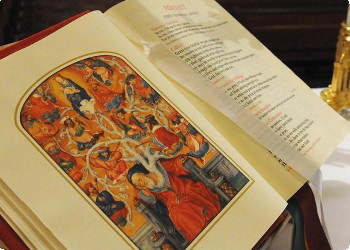Your sins are forgiven
19 SEPTEMBER (Lk 7,36-50)
In Ancient Scripture forgiveness of sins required a long, very long, heavy, very heavy ceremonial. This heaviness is all described in Leviticus.
If it is the anointed priest who thus sins and thereby makes the people also become guilty, he shall present to the Lord a young, unblemished bull as a sin offering for the sin he committed. Bringing the bullock to the entrance of the meeting tent, before the Lord, he shall lay his hand on its head and slaughter it before the Lord. The anointed priest shall then take some of the bullock’s blood and bring it into the meeting tent, where, dipping his finger in the blood, he shall sprinkle it seven times before the Lord, toward the veil of the sanctuary. The priest shall also put some of the blood on the horns of the altar of fragrant incense which is before the Lord in the meeting tent. The rest of the bullock’s blood he shall pour out at the base of the altar of holocausts which is at the entrance of the meeting tent. From the sin-offering bullock he shall remove all the fat: the fatty membrane over the inner organs, and all the fat that adheres to them, as well as the two kidneys, with the fat on them near the loins, and the lobe of the liver, which he must sever above the kidneys. This is the same as is removed from the ox of the peace offering; and the priest shall burn it on the altar of holocausts. The hide of the bullock and all its flesh, with its head, legs, inner organs and offal, in short, the whole bullock, shall be brought outside the camp to a clean place where the ashes are deposited and there be burned up in a wood fire. At the place of the ash heap, there it must be burned (Lev 4,3-12).
Jesus makes light, very light the forgiveness of sins. He free with a single Word. The heavy ritual that discourages and drives away from true repentance, conversion, request of forgiveness and return to the Father’s mercy is abolished forever. Today, Jesus teaches us that never must forgiveness of sins be a legal event and a purely judicial act. It must be inserted into a major process of love. Forgiveness of sins must never be an immanent event, something that concerns only our conscience, our heart and our life. Instead, it is the re-establishment of a relationship of love between God, the offended, and we, the offenders. Love is what wipes sin out. Where there is no great love, there is not even cancellation of sin, there.
A Pharisee invited him to dine with him, and he entered the Pharisee’s house and reclined at table. Now there was a sinful woman in the city who learned that he was at table in the house of the Pharisee. Bringing an alabaster flask of ointment, she stood behind him at his feet weeping and began to bathe his feet with her tears. Then she wiped them with her hair, kissed them, and anointed them with the ointment. When the Pharisee who had invited him saw this he said to himself, “If this man were a prophet, he would know who and what sort of woman this is who is touching him, that she is a sinner.” Jesus said to him in reply, “Simon, I have something to say to you.” “Tell me, teacher,” he said. “Two people were in debt to a certain creditor; one owed five hundred days’ wages and the other owed fifty. Since they were unable to repay the debt, he forgave it for both. Which of them will love him more?” Simon said in reply, “The one, I suppose, whose larger debt was forgiven.” He said to him, “You have judged rightly.” Then he turned to the woman and said to Simon, “Do you see this woman? When I entered your house, you did not give me water for my feet, but she has bathed them with her tears and wiped them with her hair. You did not give me a kiss, but she has not ceased kissing my feet since the time I entered. You did not anoint my head with oil, but she anointed my feet with ointment. So I tell you, her many sins have been forgiven; hence, she has shown great love. But the one to whom little is forgiven, loves little.” He said to her, “Your sins are forgiven.” The others at table said to themselves, “Who is this who even forgives sins?” But he said to the woman, “Your faith has saved you; go in peace.”
The risk is always one: asking for forgiveness, but without love. Living this most high experience of liberation from evil, but only as an event contained in our person. Then, God remains in his heaven. We on our earth. He, in his holiness. Never again in our sin and our transgressions. It is the great love that keeps us from returning into sin. If you do not see the offended God behind sin, it becomes difficult to overcome the transgression. It is the love for the person that helps us to have respect for him. Who loves respects, wants the good, wishes he never does evil.
Virgin Mary, Mother of the Redemption, Angels and Saints teach us how to love.





